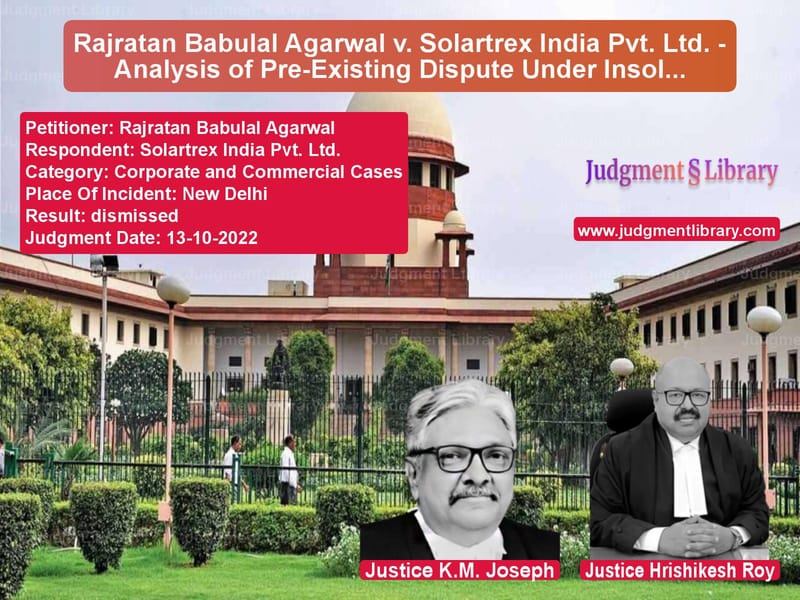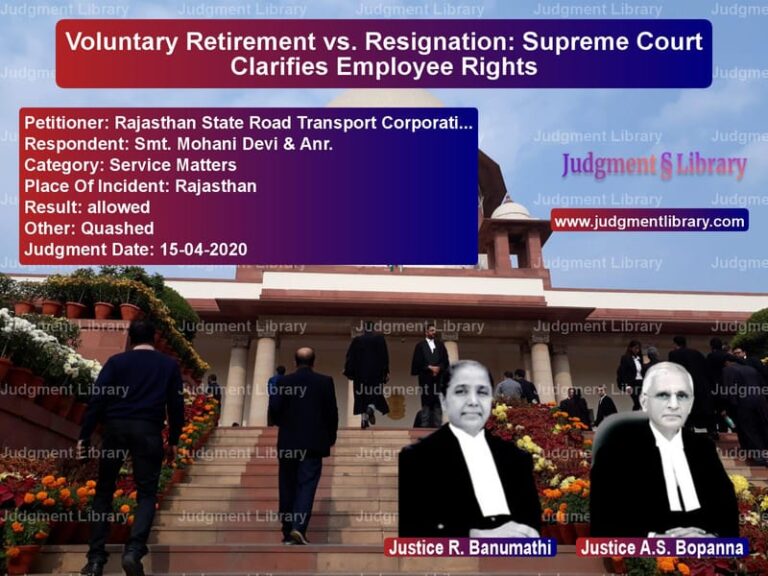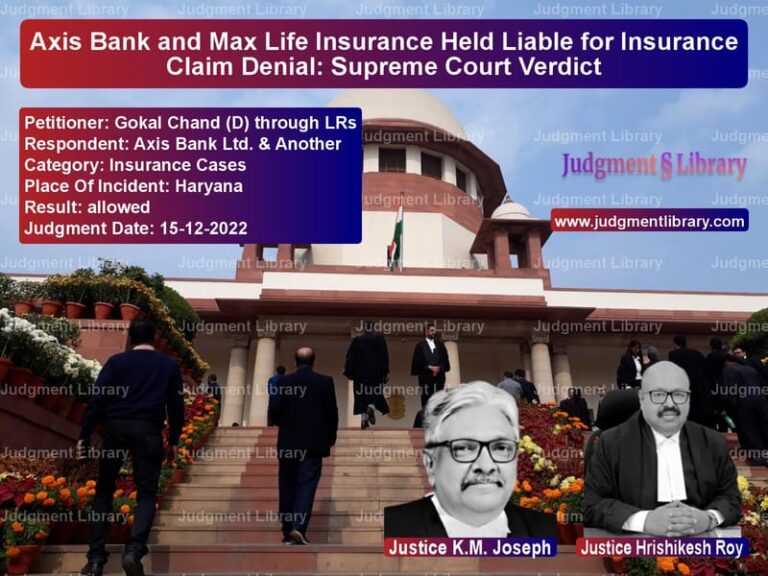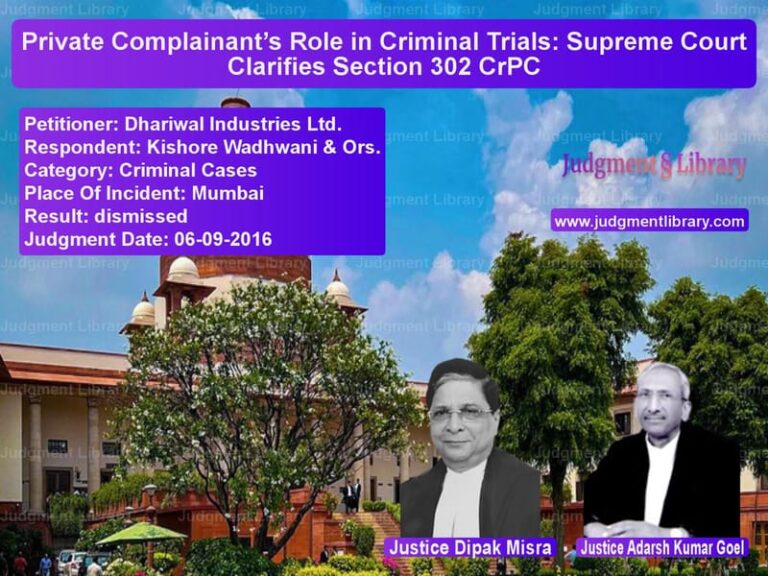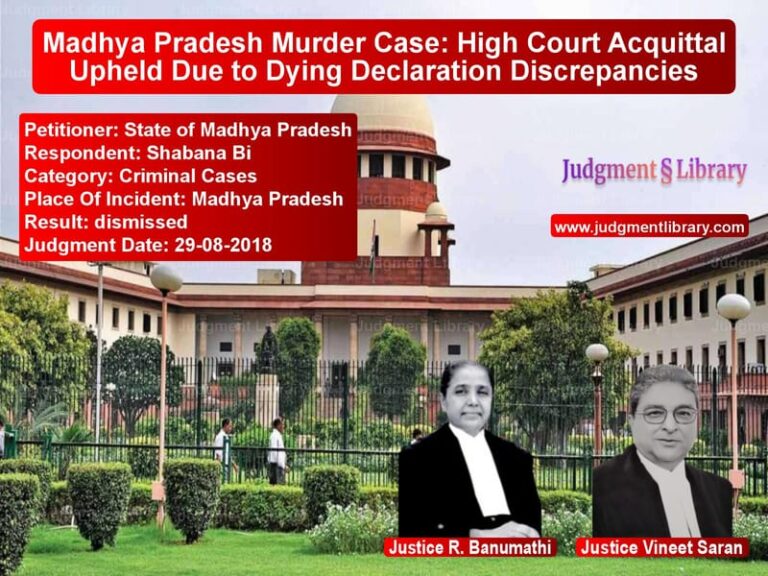Rajratan Babulal Agarwal v. Solartrex India Pvt. Ltd. – Analysis of Pre-Existing Dispute Under Insolvency and Bankruptcy Code
The present appeal arises from an order of the National Company Law Appellate Tribunal (NCLAT), which dismissed an appeal filed by Rajratan Babulal Agarwal, challenging the order passed by the National Company Law Tribunal (NCLT). The NCLT had admitted an application under Section 9 of the Insolvency and Bankruptcy Code, 2016 (IBC) filed by the first respondent, Solartrex India Pvt. Ltd., against the second respondent, alleging an operational debt.
The main issue in this case is whether a pre-existing dispute exists between the parties, as understood by the Supreme Court in the case of *Mobilox Innovations Private Limited v. Kirusa Software Private Limited*. The appellant argues that a pre-existing dispute existed, and therefore, the application under Section 9 should not have been admitted. The NCLT, however, found that the dispute raised by the appellant was not genuine, leading to the dismissal of the appeal by the NCLAT. This appeal challenges that dismissal.
Petitioner and Respondent Arguments
Petitioner’s Arguments:
- The appellant contended that the NCLT and NCLAT had erred in dismissing his arguments regarding the pre-existing dispute. He pointed to emails dated 30.10.2016, 03.11.2016, and 04.11.2016, as proof of an ongoing issue about the quality of coal delivered by the respondent. According to the appellant, these emails and lab reports showed the coal did not conform to the agreed specifications and caused damage to the boilers. He argued that these correspondences were sufficient to establish a genuine dispute between the parties, barring the application under Section 9 of the IBC.
- Further, the appellant contended that the NCLAT had ignored the legal framework of Section 13(2) and Section 59 of the Sale of Goods Act, which allowed him to challenge the goods on the grounds of quality and seek a reduction in price or a return of the goods. The appellant argued that his claims were based on solid evidence, including lab reports and his timely communications about the defects.
Respondent’s Arguments:
- The first respondent, Solartrex India Pvt. Ltd., represented by counsel, argued that the emails and communications referred to by the appellant did not constitute a valid pre-existing dispute. The respondent emphasized that the appellant had consumed the delivered coal without raising any significant claims for over 15 months, which they contended disproved the existence of a genuine dispute.
- The respondent also pointed out that the quality issues mentioned in the emails were not sufficient to invalidate the contract, as the buyer had not formally rejected the goods or issued a debit note. Moreover, the absence of a proper suit or arbitration proceedings prior to the demand notice was emphasized as evidence of a feeble defense to avoid insolvency proceedings. The respondent argued that the dispute was a mere excuse to delay payments and not based on solid legal grounds.
Key Issues and Supreme Court’s Ruling
The Supreme Court addressed several key issues in this case:
1. Pre-Existing Dispute and Its Impact on Section 9 of the IBC
The primary issue was whether a pre-existing dispute existed under the IBC, which would prevent the application from being admitted. The Court examined the correspondence between the parties, including the emails of 30.10.2016, 03.11.2016, and 04.11.2016, and the appellant’s claim of poor quality coal supplied by the respondent. The Court referred to its earlier decision in *Mobilox Innovations Private Limited v. Kirusa Software Private Limited* and emphasized that even a plausible dispute, which is not ‘spurious’, can prevent the initiation of insolvency proceedings under Section 9 of the IBC.
The Court found that while the appellant raised valid concerns about the coal’s quality, it was not enough to prove that the dispute was genuine and pre-existing. The appellant’s failure to file a suit or initiate arbitration proceedings further weakened his case. The Court noted that while the emails raised quality concerns, they did not establish a solid, bona fide dispute, as no legal action had been taken prior to the application under Section 9 of the IBC.
2. Evidence Supporting the Dispute
The Court further scrutinized the lab reports and the emails exchanged between the parties. It noted that while the appellant presented the lab reports, there was no clear evidence that the delivered coal caused actual damage, and the appellant had continued to consume the coal without formally rejecting it. The Court highlighted that under Section 42 of the Sale of Goods Act, the buyer’s use of the goods could be seen as an acceptance of the goods, and any subsequent complaints about the quality could be treated as warranty breaches rather than grounds for rejection.
3. Legal Framework Under the Sale of Goods Act
The Court referred to the relevant provisions of the Sale of Goods Act, 1930, specifically Section 13(2) and Section 59, which allow the buyer to treat a condition as a warranty in certain circumstances. The Court ruled that while the appellant could seek remedies under these provisions for breach of warranty, such a claim did not qualify as a valid defense against the insolvency proceedings under the IBC.
Conclusion
The Supreme Court dismissed the appeal and upheld the decision of the NCLAT. The Court ruled that there was no pre-existing dispute within the meaning of Section 9 of the IBC, and the appellant’s arguments were insufficient to prevent the initiation of insolvency proceedings. The Court emphasized that a plausible dispute must be supported by solid evidence and legal action, which was lacking in this case. The appellant’s failure to formally reject the goods or take legal action prior to the application under Section 9 led to the dismissal of the appeal.
This ruling reinforces the standard that a genuine pre-existing dispute must be supported by evidence and formal legal proceedings to prevent the initiation of insolvency proceedings under the IBC. The judgment clarifies that the mere existence of an informal dispute, without supporting legal action, does not suffice to avoid the IBC process.
Impact and Implications
The decision has significant implications for the application of the IBC, particularly in relation to operational debt disputes. It underscores the importance of initiating formal legal proceedings, such as filing a suit or initiating arbitration, before asserting a dispute to avoid triggering insolvency proceedings. The ruling also clarifies the limited scope for courts to examine the merits of a dispute at the initial stage of the insolvency process, focusing instead on the existence of a plausible dispute.
Petitioner Name: Rajratan Babulal Agarwal.Respondent Name: Solartrex India Pvt. Ltd..Judgment By: Justice K.M. Joseph, Justice Hrishikesh Roy.Place Of Incident: New Delhi.Judgment Date: 13-10-2022.
Don’t miss out on the full details! Download the complete judgment in PDF format below and gain valuable insights instantly!
Download Judgment: rajratan-babulal-aga-vs-solartrex-india-pvt.-supreme-court-of-india-judgment-dated-13-10-2022.pdf
Directly Download Judgment: Directly download this Judgment
See all petitions in unfair trade practices
See all petitions in Company Law
See all petitions in Bankruptcy and Insolvency
See all petitions in Corporate Compliance
See all petitions in Judgment by K.M. Joseph
See all petitions in Judgment by Hrishikesh Roy
See all petitions in dismissed
See all petitions in supreme court of India judgments October 2022
See all petitions in 2022 judgments
See all posts in Corporate and Commercial Cases Category
See all allowed petitions in Corporate and Commercial Cases Category
See all Dismissed petitions in Corporate and Commercial Cases Category
See all partially allowed petitions in Corporate and Commercial Cases Category

